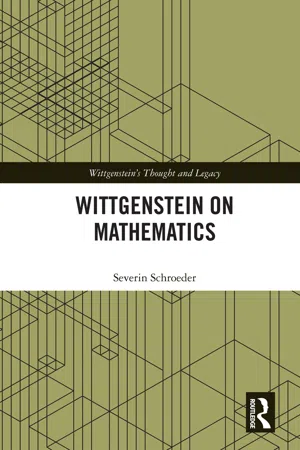
- 238 pages
- English
- ePUB (mobile friendly)
- Available on iOS & Android
Wittgenstein on Mathematics
About this book
This book offers a detailed account and discussion of Ludwig Wittgenstein's philosophy of mathematics. In Part I, the stage is set with a brief presentation of Frege's logicist attempt to provide arithmetic with a foundation and Wittgenstein's criticisms of it, followed by sketches of Wittgenstein's early views of mathematics, in the Tractatus and in the early 1930s. Then (in Part II), Wittgenstein's mature philosophy of mathematics (1937-44) is carefully presented and examined. Schroeder explains that it is based on two key ideas: the calculus view and the grammar view. On the one hand, mathematics is seen as a human activity — calculation — rather than a theory. On the other hand, the results of mathematical calculations serve as grammatical norms. The following chapters (on mathematics as grammar; rule-following; conventionalism; the empirical basis of mathematics; the role of proof) explore the tension between those two key ideas and suggest a way in which it can be resolved. Finally, there are chapters analysing and defending Wittgenstein's provocative views on Hilbert's Formalism and the quest for consistency proofs and on Gödel's incompleteness theorems.
Tools to learn more effectively

Saving Books

Keyword Search

Annotating Text

Listen to it instead
Information
Part I
Background
1 Foundations of Mathematics
- [S] 1 − 1 + 1 − 1 + 1 − 1 …
- (1 − 1) + (1 − 1) + (1 − 1) …
- 1 – (1 – 1) – (1 – 1) – (1 – 1) …
- 1 − (1 − 1 + 1 − 1 + … ).
- S = 1 − S.
Table of contents
- Cover
- Half Title
- Series
- Title
- Copyright
- Contents
- Preface
- List of Abbreviations
- Part I Background
- Part II Wittgenstein’s Mature Philosophy of Mathematics (1937–44)
- Bibliography
- Index
Frequently asked questions
- Essential is ideal for learners and professionals who enjoy exploring a wide range of subjects. Access the Essential Library with 800,000+ trusted titles and best-sellers across business, personal growth, and the humanities. Includes unlimited reading time and Standard Read Aloud voice.
- Complete: Perfect for advanced learners and researchers needing full, unrestricted access. Unlock 1.4M+ books across hundreds of subjects, including academic and specialized titles. The Complete Plan also includes advanced features like Premium Read Aloud and Research Assistant.
Please note we cannot support devices running on iOS 13 and Android 7 or earlier. Learn more about using the app